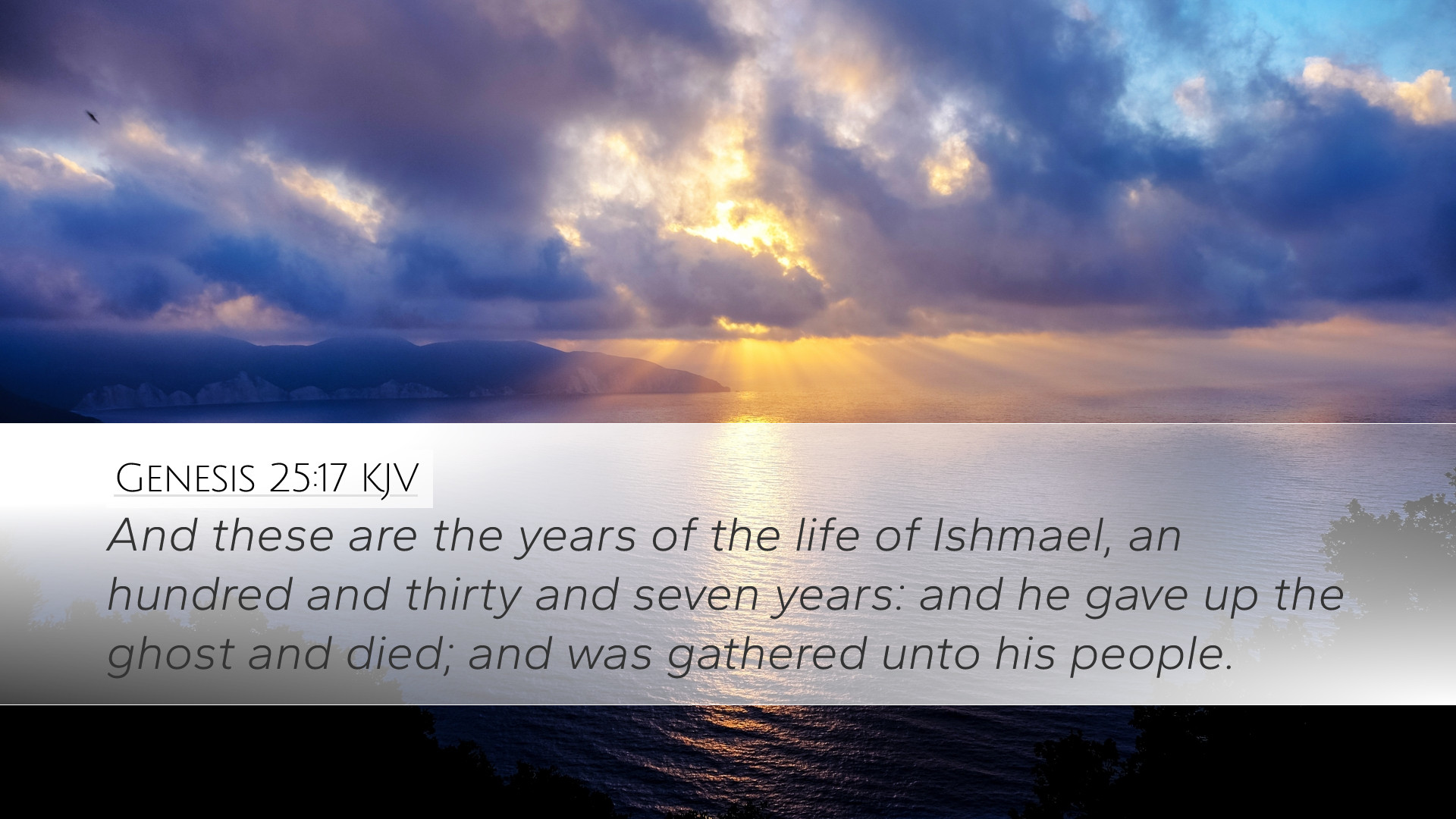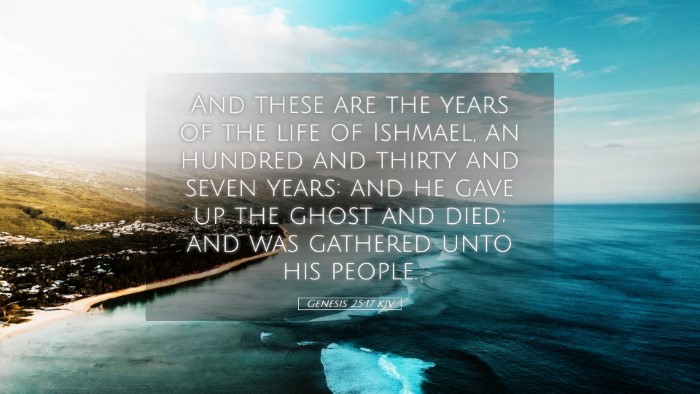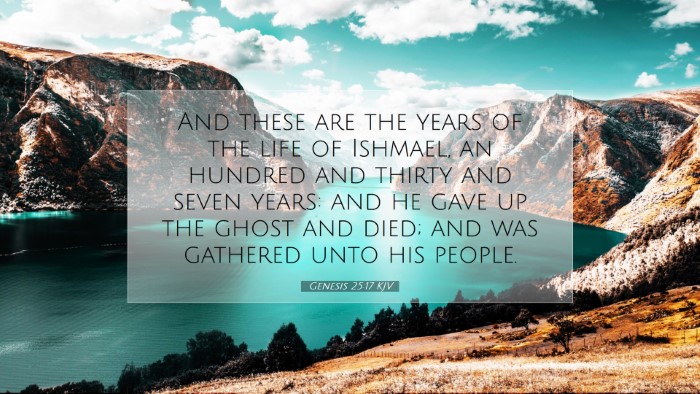Genesis 25:17 Commentary
Verse Context: Genesis 25:17 states, "These were the years of the life of Ishmael: one hundred and thirty-seven years; and he breathed his last and died, and was gathered to his people." This verse summarizes the life span and death of Ishmael, the son of Abraham and Hagar, providing a concluding note to his narrative in the Abrahamic lineage.
Main Themes
-
The Life and Legacy of Ishmael:
Ishmael's life, though marked by strife and separation from the covenant community of Abraham, holds significant value. The fact that he lived to be 137 years old highlights God's faithfulness in granting him life and prosperity, as seen in earlier promises to Hagar regarding her son (Genesis 21:18).
-
Mortality and the Human Condition:
The mention of Ishmael's death serves to remind us of human mortality. Adam Clarke notes that despite the blessings and trials of life, death is an inevitable conclusion. This reflection encourages readers to contemplate not just the span of life but the quality and legacy of the lives we lead.
-
The Gathering to One's People:
The phrase "gathered to his people" emphasizes the notion of the afterlife common in biblical texts. Matthew Henry interprets this as symbolic of divine acceptance, suggesting that Ishmael, despite his challenges, was welcomed in death into the community of his forefathers, mirroring a broader theological perspective on belonging and hope in life after death.
Commentary Insights
-
Matthew Henry's Perspective:
Henry notes that Ishmael's years were filled with conflict and struggle, yet he continued to enjoy the blessings of life bestowed upon him. His commentary reflects on the providential care of God throughout Ishmael’s life, discussing how God's plans encompass both Isaac and Ishmael, leading to the fulfillment of His promises. He suggests that Ishmael's descendants became numerous, highlighting God’s provision and intention even in their separation from Isaac and the covenant promises.
-
Albert Barnes' Analysis:
Barnes reflects on Ishmael's character and his role within the narrative of Genesis. He emphasizes the nature of the relationship between Ishmael and Isaac, noting how the separation from Isaac did not diminish Ishmael's significance in the unfolding story of God's people. Ishmael's life serves as a demonstration of God's mercy and the fulfillment of His word even towards those outside of the covenant line, showing that God's grace extends beyond human boundaries.
-
Adam Clarke's Theology:
Clarke provides an extensive historical interpretation, suggesting that Ishmael's life represents a broader context of struggle between two lineages. He discusses the implications of Ishmael's life for the current conditions of the descendants in light of theological themes such as judgment and mercy that flow through the text. His reflections touch upon the diverse fates of Abraham's descendants and the way in which God’s plans transcend immediate human relationships.
Theological Implications
-
Divine Providence:
The life span of Ishmael illustrates the theme of divine providence throughout the Scriptures. Readers and ministers are reminded that God’s plans unfold according to a divine timeline, often beyond human understanding. The longevity of Ishmael's life affirms the faithfulness of God in keeping His word, even to those who may seem on the fringes of His chosen people.
-
Identity and Belonging:
The theological concept of being "gathered to one's people" leads to reflections on identity and belonging. For pastors and theologians, this may encourage exploration of the notion of community in both life and death. This can invoke discussions on the ways believers are called to support one another in life and how communal identity extends beyond earthly existence.
-
Hope in Mortality:
The conclusion of Ishmael's life in this verse provides a focal point for discussions on hope amid mortality. It encourages believers to find solace and reassurance in God's eternal promises. Pastoral applications can derive from this as they guide congregants in dealing with issues of loss, death, and the assurance of God’s embrace in the afterlife.
Practical Applications
-
Encouragement in Trials:
The narrative surrounding Ishmael exemplifies how individuals can experience God’s providential care despite their predicament. Pastors can use this commentary to reassure those in their congregations who face difficulties that God's grace and presence are available, affirming that every life holds purpose in God’s greater plan.
-
Promoting Unity and Recognition:
Given the historical context of Isaac and Ishmael, there is room for dialogue about reconciliation and recognition among different groups within the Faith. This commentary encourages interfaith dialogue and understanding, especially in modern contexts where such divisions persist.
-
Reflections on Life's Legacy:
This verse invites congregants to reflect on their legacies while facing their mortality. It challenges them to consider what it means to live well and leave behind a faith-filled legacy that encompasses more than personal achievement, but contributes to the communal faith story.
Conclusion
Genesis 25:17 serves not only as a historical account but also as a profound theological and existential reflection. By synthesizing insights from various esteemed biblical commentators, we perceive the intertwined themes of life, legacy, community, and divine providence that speak powerfully to every generation. Pastors and scholars alike are invited to delve deeper into these dynamics, finding within them a guidance for both personal reflection and communal teaching, ultimately fostering a richer understanding of God’s enduring work in our lives and histories.


